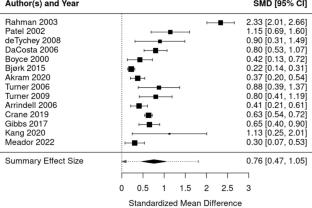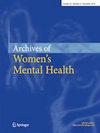身体残疾妇女产后抑郁症的患病率:一项系统回顾和荟萃分析。
IF 2.7
3区 医学
Q2 PSYCHIATRY
引用次数: 0
摘要
目的:身体残疾的孕妇和产后母亲在医疗保健机构面临歧视,孕产妇和产科并发症发生率高,怀孕前终生抑郁症发生率较高,潜在地增加了她们患产后抑郁症(PPD)的可能性。一些研究发现,身体残疾的母亲患产后抑郁症的比例高于没有身体残疾的母亲,更严重的产后抑郁症与更严重的残疾症状有关;然而,文献是稀疏和异质的。本系统综述和荟萃分析通过评估PPD与身体残疾之间的相关性,推进了这一研究领域的发展。方法:我们检索了PubMed和PsycInfo,主要的纳入标准是这些研究有一个确定的产后女性抑郁症的测量方法,或者是一个确定有身体残疾的队列,或者是一个确定的一般人群样本中身体残疾的测量方法。我们汇总了身体残疾女性PPD的患病率,并测试了我们的发现对调节因子的稳健性,包括地区、样本人群和测量类型。结果:我们的定量荟萃分析结果(n=14)显示了很强的(d=。结论:我们发现身体残疾和产后抑郁症之间有很强的联系,因此需要进行更多的研究。进一步的研究将1)增加对如何最好地概念化身体残疾妇女PPD的细致理解,2)有助于测试PPD和身体残疾之间的关联对其他重要调节因子的稳健性。本文章由计算机程序翻译,如有差异,请以英文原文为准。

The prevalence of postpartum depression among women with physical disabilities: a systematic review and meta-analysis
求助全文
通过发布文献求助,成功后即可免费获取论文全文。
去求助
来源期刊
CiteScore
8.00
自引率
4.40%
发文量
83
审稿时长
6-12 weeks
期刊介绍:
Archives of Women’s Mental Health is the official journal of the International Association for Women''s Mental Health, Marcé Society and the North American Society for Psychosocial Obstetrics and Gynecology (NASPOG). The exchange of knowledge between psychiatrists and obstetrician-gynecologists is one of the major aims of the journal. Its international scope includes psychodynamics, social and biological aspects of all psychiatric and psychosomatic disorders in women. The editors especially welcome interdisciplinary studies, focussing on the interface between psychiatry, psychosomatics, obstetrics and gynecology. Archives of Women’s Mental Health publishes rigorously reviewed research papers, short communications, case reports, review articles, invited editorials, historical perspectives, book reviews, letters to the editor, as well as conference abstracts. Only contributions written in English will be accepted. The journal assists clinicians, teachers and researchers to incorporate knowledge of all aspects of women’s mental health into current and future clinical care and research.

 求助内容:
求助内容: 应助结果提醒方式:
应助结果提醒方式:


